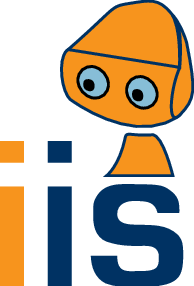Home
People
Projects
Research
Publications
Surveys
Courses
Student Projects
Jobs
Downloads
Sidebar
This is an old revision of the document!
Table of Contents
Intelligent and Interactive Systems
Making robots learn to perceive and act with understanding
At IIS we enable autonomous robots to perceive and act flexibly and robustly in unstructured environments, leveraging machine learning methods to build perceptual, motor and reasoning skills.
We seek to answer the question: How can we enable robots to acquire the knowledge and understanding they require to interact sensibly with unstructured environments?
Our research addresses complete perception-action loops, from computer vision to grasping and manipulation, using reactive algorithms and/or cognitive models. Much of our work uses machine learning to enable robots to synthesize and improve complex and robust sensorimotor behavior with experience. Related areas of interest include human-robot interaction, image and video analysis, and visual neuroscience.
Working With Us
- Check our thesis topics for Bachelor and Master students.
- We currently do not have any open PhD positions.
Group picture taken at our 2024 retreat at Meissner Haus.
News
| 2025-09-18 | Samuele Tosatto gives an invited keynote Where are all the intelligent robots? A quest for efficiency in reinforcement learning at Reinforcement Learning Bootcamp 2025, Salzburg. [Abstract]As artificial intelligence reshapes our digital world at a breathtaking pace, a curious question arises: Where are all the real-world, intelligent robots? While we have mastered the generation of text, images, and video by leveraging vast web-scale datasets, robotics still faces a fundamental data bottleneck. Reinforcement learning (RL) offers a compelling solution, enabling agents to learn autonomously by collecting their own experience. However, the path to autonomy is often blocked by the staggering inefficiency of current RL algorithms, which can require millions of trials to master simple tasks. This talk embarks on a quest to tackle this efficiency problem head-on. I will argue that a crucial step toward unlocking the potential of robot learning lies in a two-pronged approach: first, by developing statistically efficient algorithms that can reuse data by leveraging sound off-policy techniques, and second, by designing better action representations for physical, real-world agents. By making our algorithms more efficient and refining their core hypotheses, we can accelerate the journey toward real embodied artificial intelligence. |
| 2025-07-15 | Justus Piater gives an invited keynote Making robots learn to perceive and act with
understanding at The
12th ECCOMAS Thematic Conference on Multibody Dynamics, Innsbruck. [Abstract]The flexibility and robustness of current robots is limited by their lack of understanding of their environment. For this reason, most robots operate in controlled environments. Machine learning can circumvent modeling problems but introduces new problems of generalizing from examples. How can robots acquire understanding (of structure, function, causality, etc.) that allows them to generalize from sparse experience? Motivated by shortcomings of current machine-learning methods, I will argue that "understanding" is a meaningful notion in AI that reaches beyond prediction and control. I will discuss examples of our recent work on learning visual relational concepts, extrapolation of learned movements beyond the training distribution, learning of symbolic concepts and rules, and structure-driven skill learning from sensorimotor experience. Our long-term objective is to improve abstraction, generalization, robustness, and ultimately explainability of robot perception and action. |
| 2025-07-11 | Justus Piater and Alejandro Agostini give an invited talk Learning Symbols and Abstractions in Robot Planning at Abstraction: Language - Science - Engineering, Bolzano. (International Workshop) |
| 2025-04-25 | Simon Haller-Seeber gives an invited talk AI-powered tools for real-time transcription and translation in action: A self-hosted open-source framework for digital spaces. at Medien - Wissen - Bildung 2025: Streifzüge an den Nahtstellen von Medien, Bildung und Philosophie, Universität Innsbruck. |
| 2025-04-10 | Simon Haller-Seeber gives an invited keynote Hands-on Approaches to Software, Robotics, and AI: Exploring Experiments and Science in Action at European Conference on Educational Robotics (ECER 2025), HTL Anichstrasse. |
| 2025-04-10 | Simon Haller-Seeber and Christopher Kelter teach a tutorial Was sind Roboter, was macht eine KI? Entwickle deine eigene KI und programmiere unsere Minibots at Campustag BG/BRG Sillgasse, Universität Innsbruck. |
| 2025-04-03 | Justus Piater gives an invited keynote What is AI really? at Cross-Border Seminar: AI in Law and Practice: Regional Perspectives on European Rules, Universität Innsbruck. |
| 2025-03-06 | Justus Piater teaches a tutorial Funktionsweise, Möglichkeiten und Grenzen von KI at Lieber
gleich berechtigt als später: Hallo KI, hilfst du uns bei der
Gleichstellung?!, Tiroler Bildungsinstitut Grillhof Vill. [Abstract]Künstliche Intelligenz" bezeichnet derzeit Systeme, die auf maschinellem Lernen (ML) basieren. Dieser Workshop führt in die Grundlagen des ML ein, mit besonderem Augenmerk auf neuronale Netze, der derzeit populärsten ML-Technologie. Darauf aufbauend vermittelt er ein Grundverständnis für prinzipielle Möglichkeiten und Grenzen von ML und warum es mit derzeitigen Mitteln extrem schwierig ist, Diskriminierung in KI-Systemen zu verhindern. |
| 2025-02-26 | Simon Haller-Seeber and Christopher Kelter teach a tutorial Programmieren eines autonomen Roboters anhand einer selbstentwickelten KI at STAIR-Lab INNALP Workshop für das Gymnasium Ursulinenen Innsbruck, Universität Innsbruck. |
| 2025-02-26 | Marko Zarić teaches a tutorial Einführung in das Programmieren mit Microcontrollern at STAIR-Lab INNALP Workshop für das Gymnasium Ursulinenen Innsbruck, Universität Innsbruck. |
Postal Address
University of Innsbruck
Department of Computer Science
Technikerstr. 21a
6020 Innsbruck
Austria
How to find us: See the directions.
Legal Notice: See the Impress and Privacy Notice.


